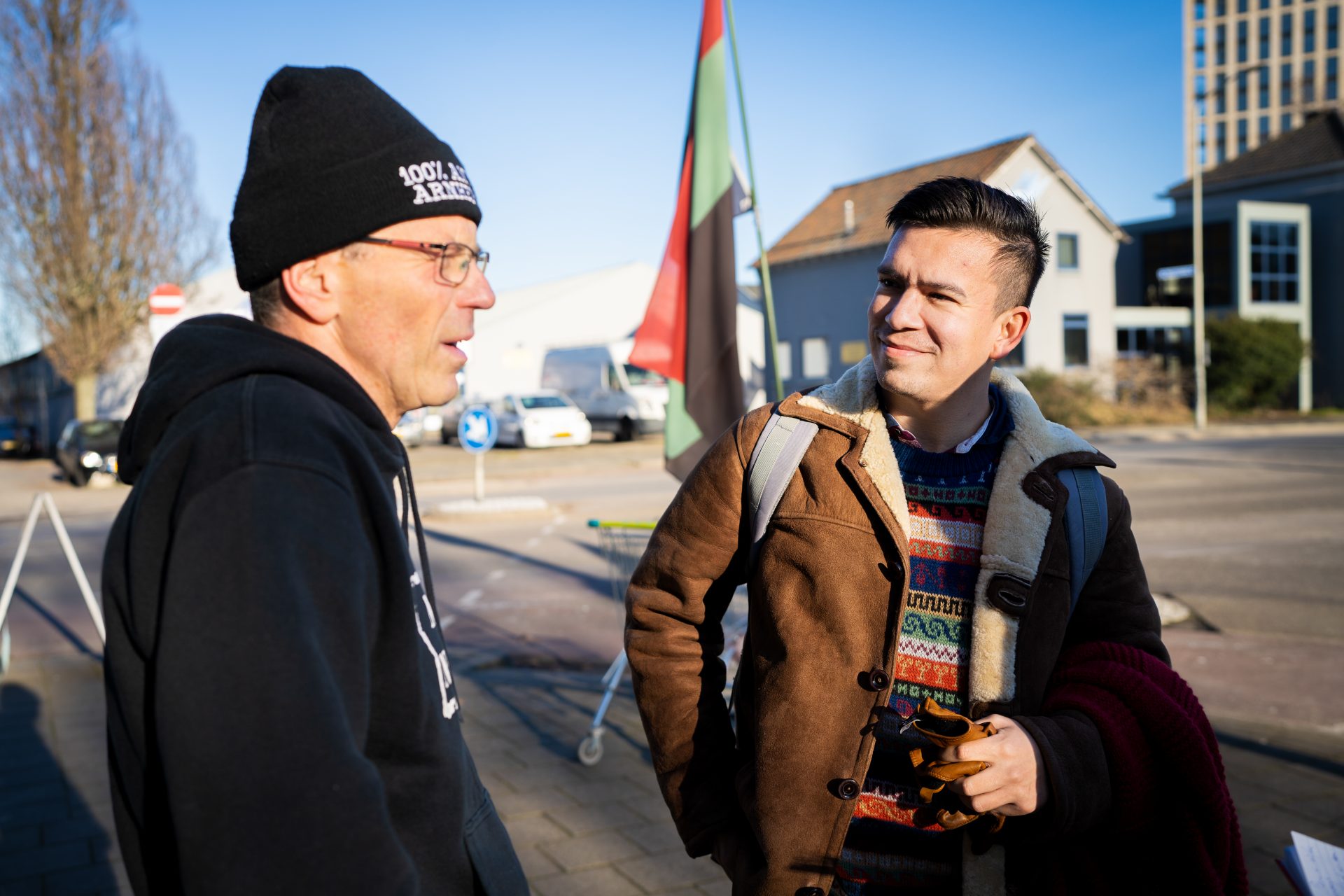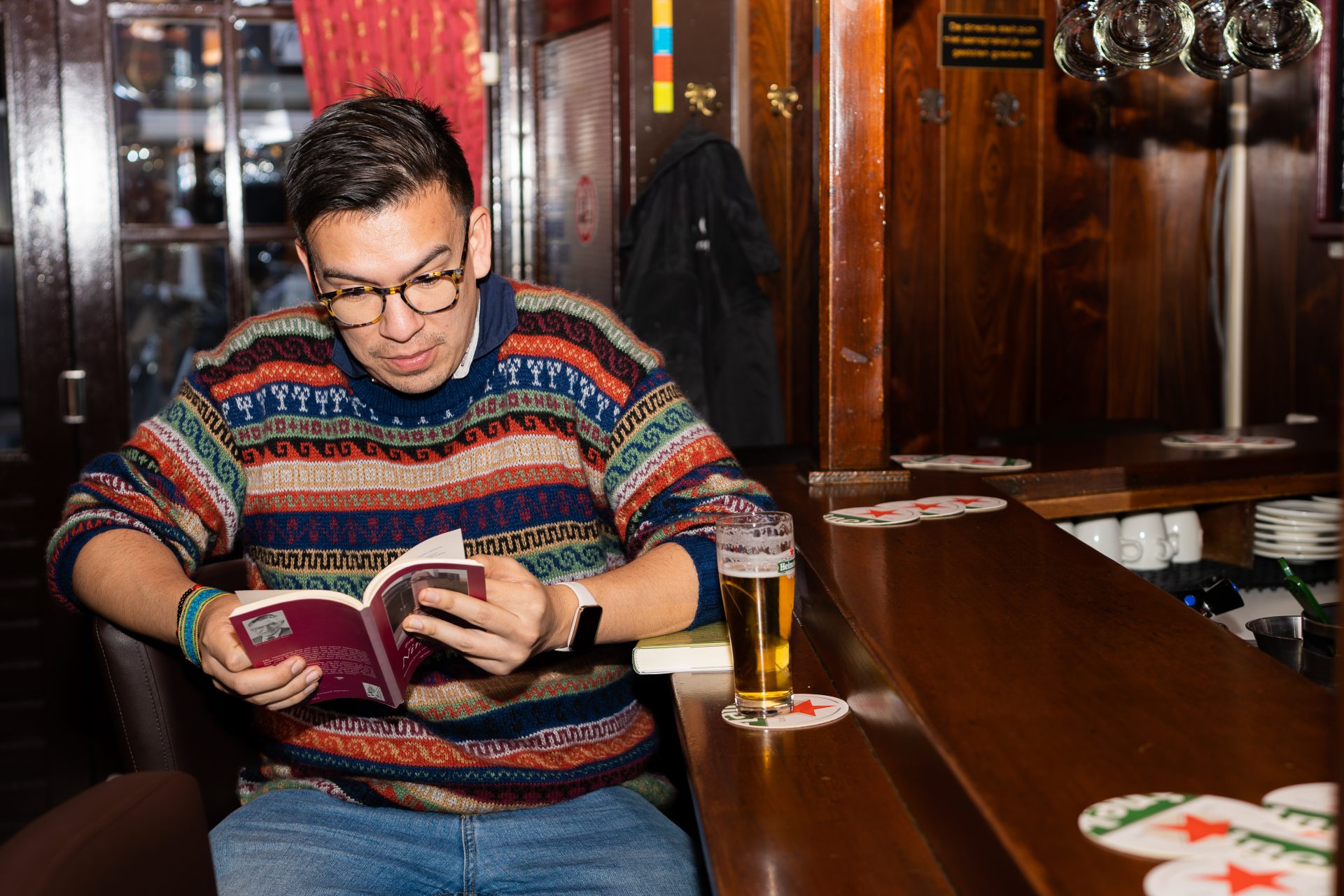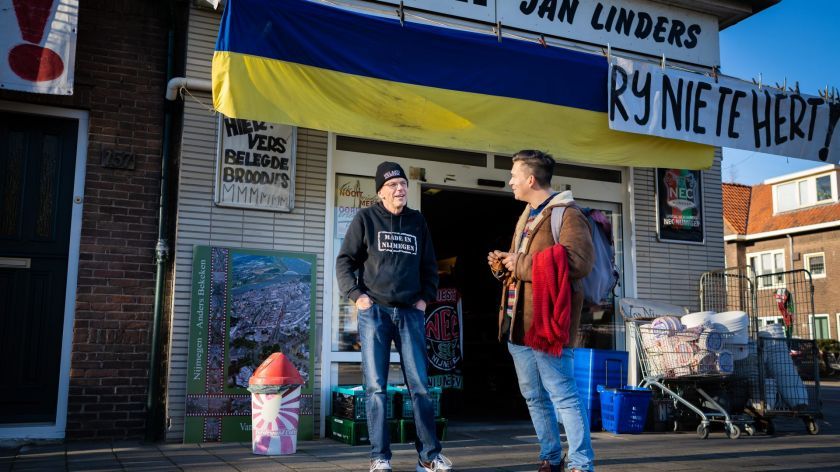From the Amazon to the Waterkwartier: Peruvian scientist to investigate ‘Nimweegs’
The doors to his office in the Erasmus building are reminiscent of the bedroom door of a young football fan; stickers that say ‘Nimweegs mot blieve’ or ‘Al mot ik krupe’ wouldn’t lead you to believe that this place belongs to a Peruvian doctor doing scientific research. But after his PhD track in the Amazon, Luis Miguel Rojas-Berscia has now set his sights on the dialect of Nijmegen.
Luis Miguel Rojas-Berscia (Lima, 1991) is waiting for us at the entrance to the Erasmus building; in his hands, he has two Nijmegen dictionaries: Kie(k) däör, wà röär and Zeg ‘t mar op z’n Nimwèègs. ‘This is what it’s all about’, according to the 31-year-old Peruvian. When we walk to collect our bikes, we’re greeted by the doorman. ‘We sien mekuir’, he yells, eliciting a smile from Rojas-Bercia. ‘Beautiful, isn’t it?’, he replies. ‘Hajje!’
Eleven languages
Next, we cycle to the Waterkwartier, where we have an appointment with a local celebrity. ‘Da’s oek ruir, hoe ken da nou?’, Hennie Linders responds when he hears his guest is from Peru but understands Nimweegs. For years, the man has run the Jan Linders, a small grocer at the Weurtseweg. The owner is famous for his Nimweegs, making him the ideal conversation partner for Rojas-Berscia. His question is justified, however: how did someone born and raised in Peru end up in Nijmegen, investigating the local dialect?
‘I can speak multiple languages, but now that I live in Nijmegen, I want to do research into the Nijmegen dialect’, Rojas-Berscia answers in unaccented Dutch. ‘I haven’t mastered Nimweegs yet’, he says, before explaining his background.
‘My classmates had issues learning language. I quickly realised I was different’
‘I grew up in Lima, and at home I was taught Spanish, Italian, and Piedmontese, an Italian regional language. When I went to primary school, I learned French and Chinese.’ The linguist developed an impressive skill for learning languages: he is a so-called hyperpolyglot, which means he can speak more than eleven languages fluently. ‘I think the total number is around 18, but I stopped counting a while ago.’ Rojas-Berscia was a very special student. ‘All around me, I saw my classmates struggling with language. I quickly realised I was different. I’ve always loved languages and I was very disciplined, so at fourteen I knew I wanted to turn this into my profession.’
Chinese teacher
To reach that goal, Rojas-Berscia studied linguistics and literature in Lima, filling the time between studying with a job as a teacher of Chinese. He eventually made it to Nijmegen for the Linguistics MA in 2013 via a German course in Essen.

After graduating, he started as a PhD candidate at the Max Planck Institute and the Faculty of Arts. He researched the language of the native Shawi tribe in South America, and he was often deep in the Amazon, away for fieldwork. Rojas-Berscia reflects: ‘The language is still spoken by 15-20.000 people. I was allowed to enter their living area and chart the development of the language. That’s very important work, because it increases the chances of their language being officially recognised and supported. A big part of the Shawi identity is in their language, which may be comparable to Nimweegs in a way. It’s anchored in people’s ideology.’ He receives a laugh in response: ‘Da’s eg heul speciaol’, according to Linders.
Lower city
A lot of native languages and peoples are disappearing in the Amazon, but is the same slated to happen to Nimweegs? ‘Disappearing tends to happen when people find no more use in speaking a language’, the Peruvian states. ‘In South America, many people consider natives to be second-class citizens. If you want a good job, or even just avoid discrimination, speaking Spanish makes more sense. That can be compared to Nimweegs, because a lot of people from Nijmegen don’t speak the language anymore, or they’re worried that speaking it seems impolite. That leads to changes in behaviour, which is hazardous to a language’s continued existence.
‘Societal and social differences led to people associating Nimweegs with poverty’
‘When I was little, everyone in the neighbourhood spoke Nimweegs’, says Linders. ‘Why did that change?’Rojas-Berscia replies: ‘That is exactly what my research is about.’ He has already developed a theory that languages change due to social events and their impact. He goes on to explain how his research came to be: ‘Nimweegs was an important subject of sociolinguistics of the 80s and 90s. At that time, people also started investigating native languages worldwide, such as in the Amazon. The idea was to return the research questions from all those studies back to the source, so that is what I want to do. What similarities are there in language use? How do we look at language aging? In principle, Nimweegs is a fine native language subject’, according to Rojas-Berscia.

‘In the past, a lot more people spoke Nimweegs, especially in the area now called the lower city’, Rojas-Berscia continues. ‘Throughout the centuries, that area became poorer. Due to national strategic interests, Nijmegen was not allowed to build outside the safe city walls. The city’s richer inhabitants moved to the Grote Markt, where people from all over the country tended to congregate. When the walls were finally torn down in 1874, the city could expand; the Oranjesingel is a good example. Because of those demographic changes, the local dialect changed as well, and the dominant language became what we now call Standard Dutch. Societal and social differences led to people associating Nimweegs with poverty; despite it being their native language, they wanted to distance themselves from it. I think you can still see that going on, with Nijmegen citizens calling their own language ugly or simply refusing to speak it.’
At the pub
We move on to Café de Beurs in the Lange Hezelstraat. The pub is a place where you’re guaranteed some Nijmegen cheer, which makes it an important inspiration for Rojas-Berscia. ‘Wah mohjij suupe?’ Linders asks. ‘I’ll take a beer, Rojas-Berscia replies as he dumps the Nimweegs dictionary on the bar in front of him. The book served as inspiration but is not a part of the study. ‘The language morphology has been very well-described, and the vocabulary is interesting, but that’s not what my research is about.’ Rojas-Berscia listens very intently to everyone at the pub, occasionally making a note. The goal of his research is not to create a new word list, but to understand the dynamics of Nimweegs. ‘I want to understand it and its place in the ‘language landscape.’
How does he intend to do that? ‘ The study aims to have people from Nijmegen talk to each other in pairs; that can be done in the pub or at the office. I record the conversations and have them transcribed. The recordings should grant insight into what Nimweegs means to the people speaking it.’ The social element is mainly of importance. ‘What does the language mean to those that still speak it? The answer to that question can vary per person, and I want to see how people from Nijmegen experience their language.’
‘This research is also a way for me to show my appreciation for the city’
It is clear that Rojas-Berscia can be found in Nijmegen for a while longer; he has no plans to return to Latin America for any length of time. ‘I’ve built up a solid connection with Nijmegen. This is my city, where I feel at home. On top of that, I owe this city my livelihood. This research is also a way for me to show my appreciation for the city, a way to say thank you.’
Eventually, Rojas-Berscia wants to publish all the conversations used in his research in a book, to be made available to everyone in Nijmegen. ‘I guess that is a little bit like what I did for the Shawi in the Amazon’, the scientist laughs.
Rojas-Berscia’s research will officially commence next month. He hopes to present the results, as well as the book, in 2025.
Translated by Jasper Pesch.




